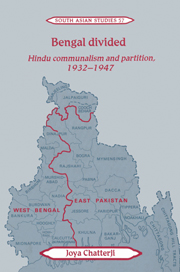Book contents
- Frontmatter
- Contents
- List of maps
- List of tables
- Acknowledgements
- List of abbreviations
- Glossary
- Map 1 Bengal districts
- Introduction
- 1 Bengal politics and the Communal Award
- 2 The emergence of the mofussil in Bengal politics
- 3 The reorientation of the Bengal Congress, 1937–45
- 4 The construction of bhadralok communal identity: culture and communalism in Bengal
- 5 Hindu unity and Muslim tyranny: aspects of Hindu bhadralok politics, 1936–47
- 6 The second partition of Bengal, 1945–47
- Conclusion
- Appendix
- Bibliography
- Index
- Cambridge South Asian Studies
Introduction
Published online by Cambridge University Press: 04 August 2010
- Frontmatter
- Contents
- List of maps
- List of tables
- Acknowledgements
- List of abbreviations
- Glossary
- Map 1 Bengal districts
- Introduction
- 1 Bengal politics and the Communal Award
- 2 The emergence of the mofussil in Bengal politics
- 3 The reorientation of the Bengal Congress, 1937–45
- 4 The construction of bhadralok communal identity: culture and communalism in Bengal
- 5 Hindu unity and Muslim tyranny: aspects of Hindu bhadralok politics, 1936–47
- 6 The second partition of Bengal, 1945–47
- Conclusion
- Appendix
- Bibliography
- Index
- Cambridge South Asian Studies
Summary
When Curzon partitioned Bengal in 1905, this elicited a storm of protest which forced the government to rescind his decision within six years. Indeed, Bengal's reputation for being in the vanguard of Indian nationalism owes much to the agitation which upset the ‘settled fact’ of partition, and which introduced new techniques of mobilisation to Indian politics.
In 1947, Bengal was partitioned again, following horrific clashes between Hindus and Muslims. On this occasion, however, hardly a voice was raised in protest. On the contrary, the second and definitive partition of Bengal was preceded by an organised agitation which demanded the vivisection of the province on the basis of religion. This movement was led by the very same section of Bengali society that had dominated its nationalist politics since the time of Bengal's first partition: the so-called bhadralok or ‘respectable people’. In less than forty years, bhadralok politics had come full circle, moving away from nationalist agendas to more parochial concerns. The central purpose of this work will be to explain these changes in bhadralok politics and to interpret their apparent shift from ‘nationalism’ towards ‘communalism’.
The relationship between Indian nationalism and communalism is complex and ambivalent, both in terms of ideology and political practice. Recent studies have argued that nationalism in India cannot be regarded as the ‘other’ of communalism. The opposite of communalism is secularism, which separates politics from religion. Admittedly, many aspects of Indian nationalism were not in this sense secular: nationalist campaigns often manipulated religious imagery and issues to win popular support.
- Type
- Chapter
- Information
- Bengal DividedHindu Communalism and Partition, 1932–1947, pp. 1 - 17Publisher: Cambridge University PressPrint publication year: 1994



